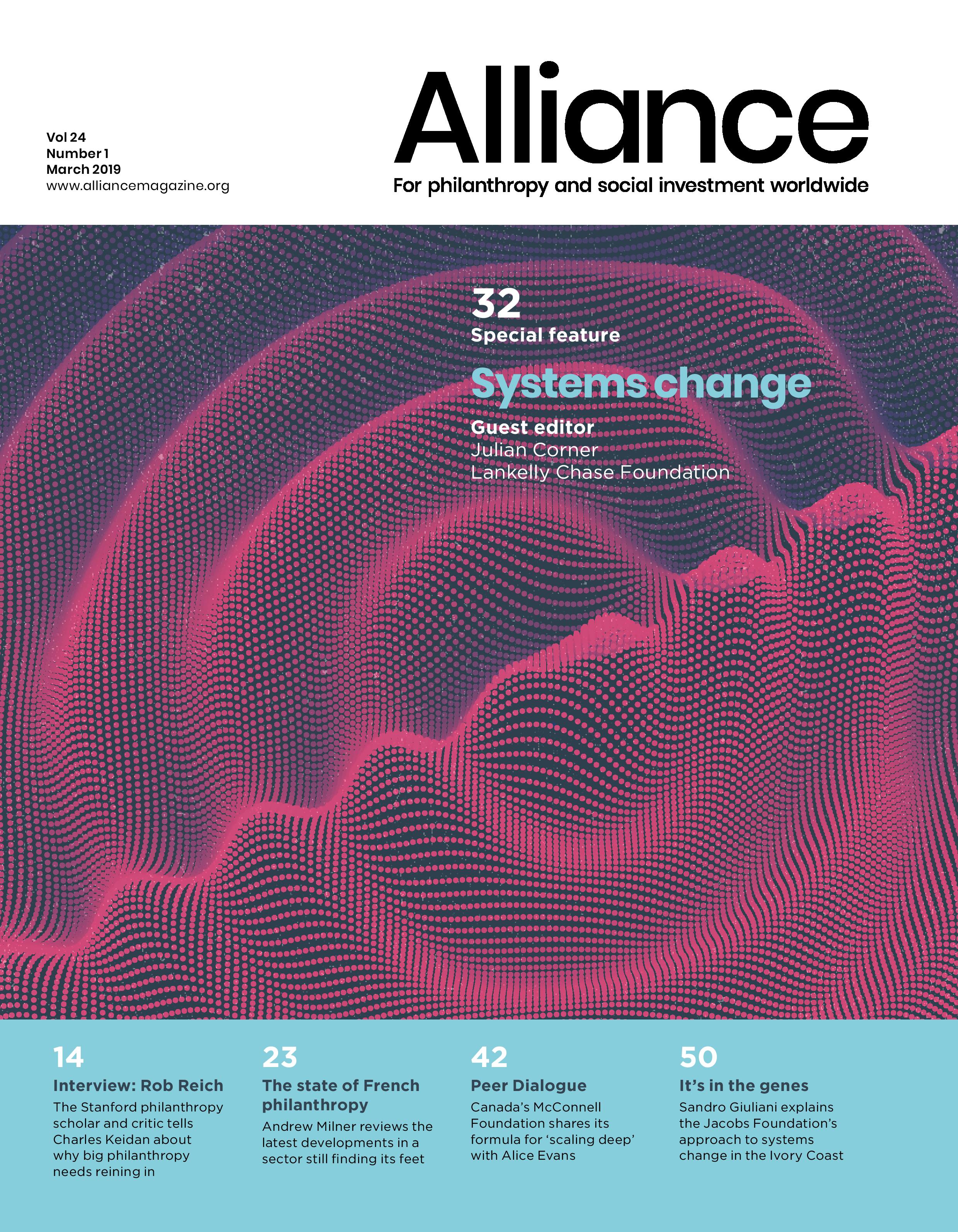The intervention of development organisations in the global South has given rise to accusations of ‘neo-colonialism’. Netherlands-based Hivos is addressing this legitimacy issue by maximising the freedom of local partners
North-South philanthropy is growing as a proportion of Official Development Assistance (ODA).[1] Money alone is not the issue, though. If such aid is to be effective, systems change approaches are increasingly seen as necessary. However, by nature, and in history, development aid and Northern funding have been criticised as being ‘neo-colonial’, guided by geo-strategic considerations and contributing to maintaining economic inequalities. Systems change approaches, therefore, throw up wider considerations than whether or not they work.
The need for a systems change approach
Hivos looks at innovative ways to find solutions for some of the most urgent global challenges, such as climate change, increasing inequality, human rights infringements and the shrinking civic space. We recognise that, to meet these challenges, system change is often needed since simply providing development aid will not lead to the necessary transformation. We have also seen that simply providing funding is not enough. Hence, we need to question ourselves: how do we know if what we are funding or implementing is likely to contribute to systemic change?
Hivos incorporates in its organisation and programmes the systems change principles of action, such as developing collective solutions, building a learning culture and not overly relying on top-down leadership. Also, Hivos’ earlier actions and holistic approach to development challenges and social problems, which it more recently labelled social innovation, can be seen from the different perspectives outlined in New Philanthropy Capital’s guide to systems change. Looking at those perspectives, one could say that Hivos has approached change by combining an advocate and practitioner perspective with the flexibility and adaptability of a learner’s perspective.
Being globally active with decentralised offices we try to bring solutions to scale by influencing policies, triggering media interest and citizen action for alternative solutions to persistent problems.
One way in which we put these perspectives into practice is Hivos’ work with strategic partnerships to create impact in developing countries. These partnerships consist of diverse stakeholders – governments, private sector, INGOs and local NGOs – with whom we develop a common agenda to support frontrunners, build local/national capacity for lobbying and advocacy and sometimes improving service delivery. An example of such a strategic partnership is the Zambia Food Change Lab, which aims to foster a collective understanding of Zambia’s current food system and the challenges it faces in the future. It strengthens collaboration among consumers, farmers, entrepreneurs, civil society and government to foster long-term engagement, collective leadership and joint initiatives. Sustainable ownership is a priority in developing the programme to make a long-lasting change.
Alongside these partnerships, we have seen the need for investment in social enterprises to create impact and economic development. Through Hivos Impact Investment, we invest in early-stage companies in sustainable food, companies that are scalable on both finance and impact. Sustainability and impact are leading considerations in the selection of new investments and in line with our holistic approach we have linked this investment instrument to our lobbying and advocacy work and our entrepreneurship on ‘sustainable diets’.
Over time, our role has changed, from only funding civil society to connecting them to different networks, providing start-up funding, training and multi-actor platforms. Being globally active with decentralised offices we try to bring solutions to scale by influencing policies, triggering media interest and citizen action for alternative solutions to persistent problems. From the early 1990s, our initiative to look at the HIV/Aids challenge for key populations from a human rights angle instead of a medical angle is an example of how we scale out successful solutions to other countries and regions, which has brought in interest and funding from funders.
The legitimacy question
However, intervening in a system can be even more contentious than funding an isolated programme. Two things make us particularly vulnerable to accusations of neo-colonialism: first, being funded mainly by bilaterals, multilateral ODA or philanthropy; second, choosing thematic areas that can be controversial, such as sexual rights and diversity. Hivos recognises the problems it has regarding its legitimacy to act in the global South. Questions have been raised about this in the past, for example when we were promoting LGBTI rights, or currently, with Brazil’s new President Bolsonaro openly questioning the legitimacy of international organisations.
The challenge and dream remain to create an enhanced global organisation, where our Southern partners have a majority stake in the work and make the decisions, an organisation with a stronger constituency and legitimacy.
Our response has always been to support frontrunners, local civil society actors and activists in the global South. From our establishment in 1968, we have tried to minimise our influence, balancing institutional support for local organisations, maximising their freedom and trying to prevent dependency on our funding. Hivos has also made sure that it is located close to its partners and has gradually created a very diverse workforce with only a handful of Northerners working in the global South. In 1988, Hivos started its decentralisation process, establishing its first regional office in Harare, to ensure easier access to partners, more tailor-made programming and a more diversified staff. Currently, we have four regional hubs and over ten country offices. Around 70 per cent of our staff work in the hubs.
While we struggle to move global support functions, that by nature of the work are centrally organised, to the regional hubs, we are taking steps to transfer implementation of all programmes and decision-making to the global South. We continue to examine ourselves to try to ensure ‘ownership for sustainability’. The challenge and dream remain to create an enhanced global organisation, where our Southern partners have a majority stake in the work and make the decisions, an organisation with a stronger constituency and legitimacy.
Edwin Huizing is executive director of Hivos
Email ehuizing@hivos.org
Twitter @hivos
Sjoerdsje van Ommen is Hivos executive board assistant
Email sommen@hivos.org
Twitter @sjoerdsjevo
Footnotes
- ^ UNDP (July 2014) Philanthropy as an emerging contributor to development cooperation https://tinyurl.com/UNDP-CSO-philanthropy







Comments (0)